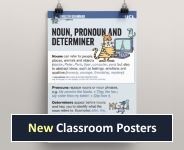Glossary
The Englicious Glossary includes the new National Curriculum glossary terms, which are shown against a white background. However, there's much more to be found here:
- we have added many entries that we feel are important, but cannot be found in the NC Glossary (e.g. connective), and
- in many cases we have added information to the (often very brief) NC entries that need further explanation (e.g. clause and phrase).
Please note that in line with our practice throughout the site, we use capital letters for function terms such as Subject, Direct Object, Indirect Object, Modifier, etc. Although this convention is not followed in the documentation published by the Department for Education we have also done so in the text that forms part of the National Curriculum Glossary.
Tip: Within our units and resources, Glossary items appear highlighted within the text. When you hover over them, or click on them in the Slideshow, a popup is generated.
letter
A written character of the alphabet.
lexeme
The dictionary entry of a word. E.g. the nouns cat and cats belong to the lexeme cat, and the verbs sing and sings belong to the lexeme sing.
lexical base
Element from which different words can be formed, for example by adding a short ending (suffix) or beginning (prefix). For instance, starting from the lexical base kind, we can form different words such as kindness, kindly and unkind.
lexical verb
Another term for main verb. A verb that conveys the primary action, process or state (e.g. chatter, know, smash), and can be used on its own (e.g. They chattered).
lexical word
See content word.
lexis
'Lexis' is another way to refer to words.
linking device
Any item used in grammar to link words, phrases or clauses with other words, phrases or clauses. Among the linking devices we find conjunctions, linking Adverbials and pronouns. See also cohesive device.
linking verb
A verb like seem, appear or be which links a Subject to an expression which describes or identifies the Subject. Examples are He seems nice and She is the prime minister of Australia. Another term used is copular verb (or copula).
locative there
The usage of there indicating a location. E.g. I live there. See also existential there.

